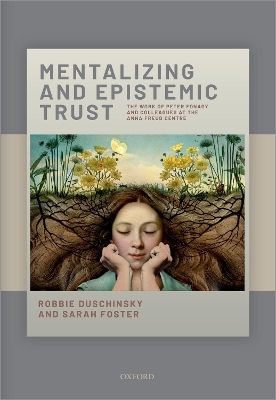
Mentalizing and Epistemic Trust
Oxford University Press (Verlag)
978-0-19-887118-7 (ISBN)
This is an open access title available under the terms of a [CC BY-NC-ND 4.0 International] licence. It is free to read at Oxford Clinical Psychology Online and offered as a free PDF download from OUP and selected open access locations.
The theory of mentalizing and epistemic trust introduced by Peter Fonagy and colleagues at the Anna Freud Centre has been an important perspective on mental health and illness. Mentalizing and Epistemic Trust is the first comprehensive account and evaluation of this perspective. The book explores twenty primary concepts that organize the contributions of Fonagy and colleagues: adaptation, aggression, the alien self, culture, disorganized attachment, epistemic trust, hypermentalizing, reflective function, the P factor, pretend mode, the primary unconscious, psychic equivalence, mental illness, mentalizing, mentalization-based therapy, non-mentalizing, the self, sexuality, the social environment, and teleological mode. The biographical and social context of the development of these ideas is examined. The book also specifies the current strengths and limitations of the theory of mentalizing and epistemic trust, with attention to the implications for both clinicians and researchers.
This book will be of interest to historians of the human sciences, developmental psychologists, and clinicians interested in taking a broader perspective on psychological theory and concepts.
Dr Robbie Duschinsky is Senior University Lecturer in Social Sciences in the Primary Care Unit at the University of Cambridge, and Fellow and Director of Studies at Sidney Sussex College. His study of attachment research has been supported by an Investigator Award from the Wellcome Trust. He is the author of Cornerstones of Attachment Research (OUP), and with Kate White he is the co-editor of Trauma and Loss: Key Texts from the John Bowlby Archive (Routledge). He is also the co-author of Sustaining Social Work: Between Power and Powerlessness (Palgrave Macmillan). Sarah Foster is a Lecturer in the Faculty of Health and Life Sciences at the University of Northumbria, and a Visiting Researcher in the Primary Care Unit at the University of Cambridge. Sarah teaches psychological theories and concepts to students on Social Work and Guidance and Counselling degree courses. She is also undertaking doctoral research on attachment theory and its relevance to clinical and social work practice.
Introduction
1: Biographical context
2: Work at the Anna Freud Centre
3: Mentalizing in development
4: Mentalization in transition
5: Forms of non-mentalizing
6: Conceptualising the 'self'
7: Adaptation and mental health
8: Mentalization-based therapies
9: The wider social system
Conclusions
| Erscheinungsdatum | 21.08.2021 |
|---|---|
| Verlagsort | Oxford |
| Sprache | englisch |
| Maße | 179 x 253 mm |
| Gewicht | 684 g |
| Themenwelt | Geisteswissenschaften ► Psychologie ► Entwicklungspsychologie |
| Medizin / Pharmazie ► Medizinische Fachgebiete ► Psychiatrie / Psychotherapie | |
| Naturwissenschaften | |
| ISBN-10 | 0-19-887118-X / 019887118X |
| ISBN-13 | 978-0-19-887118-7 / 9780198871187 |
| Zustand | Neuware |
| Informationen gemäß Produktsicherheitsverordnung (GPSR) | |
| Haben Sie eine Frage zum Produkt? |
aus dem Bereich


